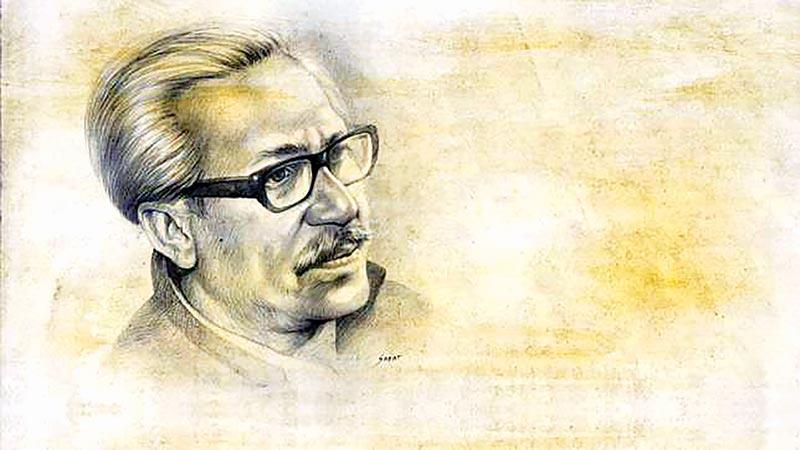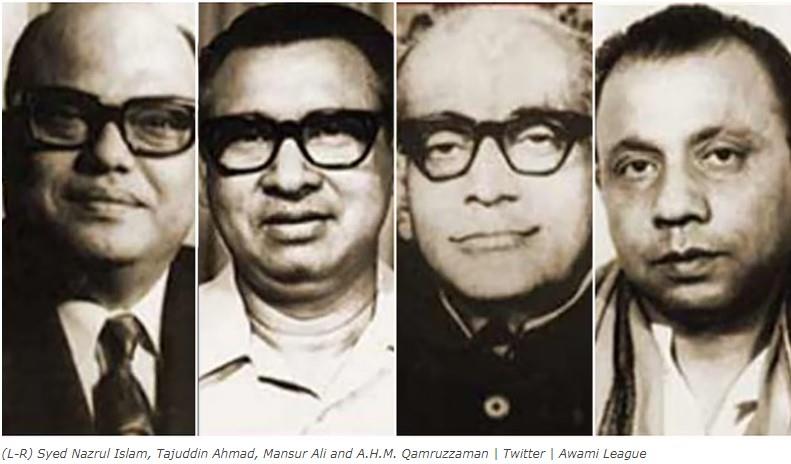
Birth pangs of the Bengal Tiger
By P.K.Balachandran/Daily Mirror
Bangladesh is today hailed as a South Asian“Tiger” for its rapid economic development. But its early years as an independent country were traumatic, not just because it was a“basket case” but because it was torn by violence and instability for more than three decades.
The liberation war took an estimated three million lives. And just four years into its existence began a series of assassinations, military coups, counter coups, attempted coups and mutinies before Bangladesh settled down to peaceful economic growth under the leadership of Sheikh Hasina.
Bangladesh's founder, Sheikh Mujibur Rahman and 14 members of his family were massacred on August 15, 1975 by junior army officers. On November 3 1975, four of Mujib's closest political associates (former Prime Ministers Tajuddin Ahmed and Mansur Ali, former Vice President Syed Nazrul Islam, and President of the Awami League, A. H. M. Qamaruzzaman) were gunned down in the Dhaka Central jail, again by a group of junior army officers.
On the day of the jail killings, Gen.Khalid Mosharraf led a coup against Khondekar Mushtaq Ahmad, who had succeeded Sheikh Mujib. But on November 7, Mosharaff himself was assassinated by forces loyal to army chief Zia-ur-Rahman. In 1977, Zia-ur-Rahman seized power from President Abu Sayem. Zia was ruthless, executing at least 200 soldiers who tried to overthrow him in October 1977. He was said to have survived 21 attempts on his life, but was killed in an attempted coup by Maj. Gen. Mohammad Abdul Manzoor in May 1981. Though another attempted coup led by Maj. Gen. Abul Monjur was suppressed, army chief Gen.H.M. Ershad toppled President Abdus Sattar in a bloodless coup in 1982. Ershad formally became Bangladesh President in 1983. But he stepped down in 1990 following popular agitations. In 1996, Army chief Abu Saleh Nasim attempted to overthrow the then President, Abdur Rahman Biswas, but key units of the army stood by the President.
The Context
Explaining the frequency of coups and unrest in the Bangladesh army till recently, an informed source said that the Bangladesh army took shape in the crucible of an armed liberation movement. It was therefore highly politicized from the very beginning. And because the military was armed, issues within it, and issues with civilian politicians, tended to be settled by violence and assassinations.
But the army changed when Bangladesh moved from political scheming to economic development under Sheikh Hasina since 2009. Knowing the power of the army and its political past, Sheikh Hasina has been respectful and accommodating to its need for good pay and other facilities. The army gets the weapons it wants and from the sources it favors. A peaceful Bangladesh has also ensured that the army keeps getting lucrative UN Peacekeeping assignments. No wonder, the army helped Hasina put down a mutiny in the Bangladesh Rifles (BDR) in February 2009 in which 50 were killed. In 2013, 152 BDR rebels were sentenced to death and 157 got life sentence.

Sheikh Mujibur Rahman
Mujib's Assassination and Jail Killings
However, an issue which refused to go away was the question of punishing the killers of Sheikh Mujib and his four colleagues. The judicial process in these cases had suffered setbacks due to the hostility of non-Awami League governments and the military. Though justice began to be done from 1996 onwards after Sheikh Hasina came to power, many of the accused had successfully evaded the law by fleeing the country. Efforts are now being made to bring back Maj. Khairuzzaman, an accused in the jail killings case, who was rewarded with the post of High Commissioner in Malaysia by a previous regime. But Dhaka might hit a snag in dealing with Maj.Khairuzzaman. He was discharged by a court in 2004.
The assassins of the Awami League leaders had publicly boasted about their deed because they had the support of President Khondekar Mushtaque Ahmad, who the military had put in power in Mujib's place. Mushtaque had gleefully hailed the killers as“Soorjo Shontan” (sons of the sun) and passed the“Indemnity Ordinance” to let the killers go scot free. Subsequently, military dictator Gen. Zia-ur-Rahman, who had also tacitly backed the killings, put the Indemnity Ordinance into the statute book. The next military dictator Gen H.M. Ershad sat over the cases. Even the elected government of Begum Khaleda Zia, which came into existence in 1991, did nothing because Khaleda's husband, former President Gen.Zia-ur-Rahman, had supported the assassins.
In 2004, the Dhaka Metropolitan Sessions Court held 15 of the 20 accused ex-army officers guilty and released the other five. Among those convicted, 3 fugitives were given the death sentence and other 12 got life sentences. Three were discharged.
The three who got the death sentence were: Sentry Marfot Ali Shah, Sergeant Moslemuddin alias Hiron Khan and Sentry Mohammad Abul Hashem Mridha. Those given life sentence were: Col. Syed Faruque Rahman, Col. Syed Shahriar Rashid, Maj. Bazlul Huda, Lt. Col. Khondokar Abdur Rashid, Lt. Col. Shariful Haque Dalim, Lt. Col. MHMB Nur Chowdhury, Lt. Col.AKM Mohiuddin Ahmed, Lt. Col.AM Rashed Chowdhury, Maj Ahmed Shariful Hossain, Capt.Abdul Majed, Capt.Mohammad Kismat Hossain and Capt. Nazmul Hossain Ansar.
Those released were Bangladesh Nationalist Party leader KM Obayedur Rahman, Jatiya Party leader Shah Moazzem Hossain, ex minister Taher Uddin Thakur, Nurur Islam Monjur and Maj.M. Khairuzzaman.
The High Court, to which the case moved, gave its verdict in 2008. It maintained the death sentence on Sgt. Moslemuddin but released the other two. Lt. Col. Syed Faruqe Rahman, Lt. Col. Shahriar Rashid Khan, Maj. Bazlul Huda and Lt. Col.AKM Mohiuddin Ahmed were also released.
On hearing the verdict, the families of the dead leaders and the Awami League were livid, describing the verdict as farcical. They justifiably complained that nobody was punished for planning and directing the assassinations. They demanded re-investigation and re-trial.
However, though released from the jail Killing case, Lt. Col. Syed Faruqe Rahman, Lt. Col. Shahriar Rashid Khan, Maj. Bazlul Huda and Lt. Col. AKM Mohiuddin Ahmed were given the death sentence in the case relating to the assassination of Sheikh Mujibur Rahman. They were executed on 27th January 2010.
The jail killings case was taken to the Supreme Court in 2012. In 2013, the court dismissed the verdict given by the High Court in 2008 and endorsed the verdict given by the lower court in 2004. Accordingly, the three fugitives, Sgt. Moslemuddin alias Hiron Khan, Sentry Marfot Ali Shah and Sentry Mohammad Abul Hashem Mridha, were given the death sentence and the other 12 got life imprisonment.
But Lt.Col.Khondekar Abdul Rashid, Lt.Col.Shariful Haque Dalim, Maj.Ahmed Shariful Hossain, Lt.Col.Rashid Chowdhury, Capt.M.Kismat Hossain, and Capt.Najmul Hossain Ansar and Maj.Khairuzzaman were still absconding. Capt. Abdul Majid was caught and executed in 2020. Maj. M.Khairuzamman is now in the net awaiting extradition from Malaysia.
International Crimes Tribunal
An International Crimes Tribunal (ICT) was set up by Sheikh Mujibur Rahman in 1973 to try Pakistanis and their local collaborators for war crimes committed in 1971. But most of the accused Pakistani army men had been repatriated to Pakistani. Action against the locals collaborators was stalled by anti-Mujib regimes after Mujib's assassination in 1975.
The ICT was revived in 2010 by Sheikh Hasina. But it had controversial provisions which came under fire internationally. However, despite street violence by Jamat-e-Islami which led to hundreds of deaths, a few were sentenced to death and executed.
Commenting on the trials, Surabhi Chopra wrote in the 'Journal of Genocide Research' that when justice is delayed, effective prosecution and adjudication becomes challenging. The quality of evidence erodes over time, witnesses will be difficult to locate or will be unable to recall events in sufficient detail. The ICT judgements suggested that the judges“acutely felt the weight of Bangladesh's history and the impunity that perpetrators of brutal violence had enjoyed under previous regimes.”
END

Legal Disclaimer:
MENAFN provides the
information “as is” without warranty of any kind. We do not accept
any responsibility or liability for the accuracy, content, images,
videos, licenses, completeness, legality, or reliability of the information
contained in this article. If you have any complaints or copyright
issues related to this article, kindly contact the provider above.

















Comments
No comment